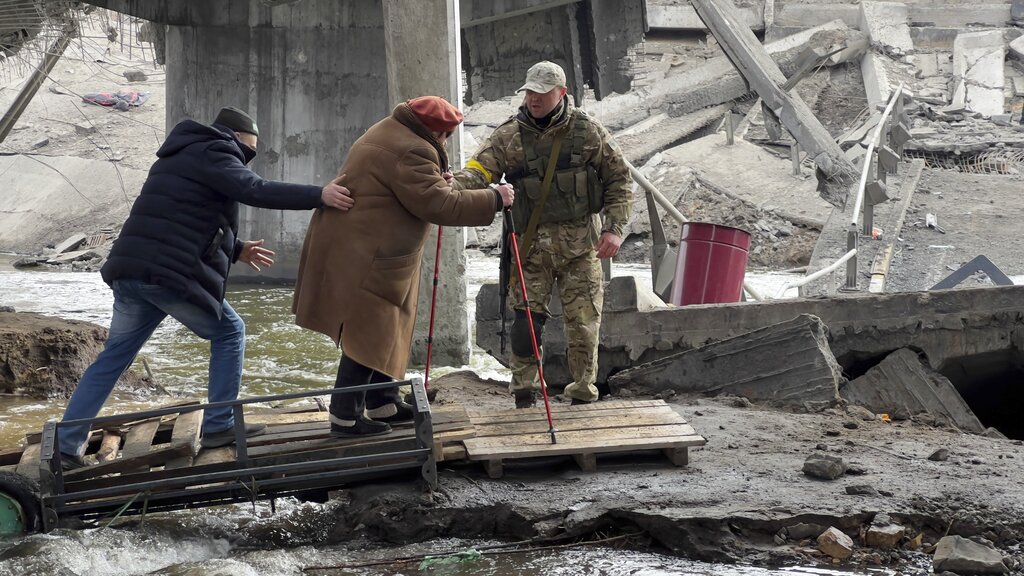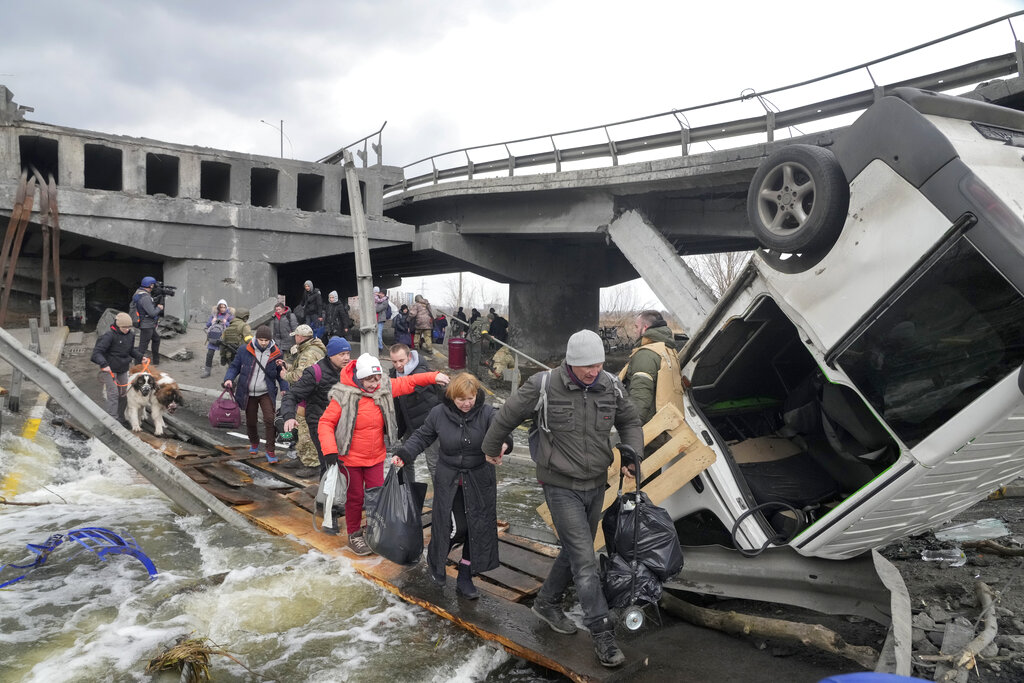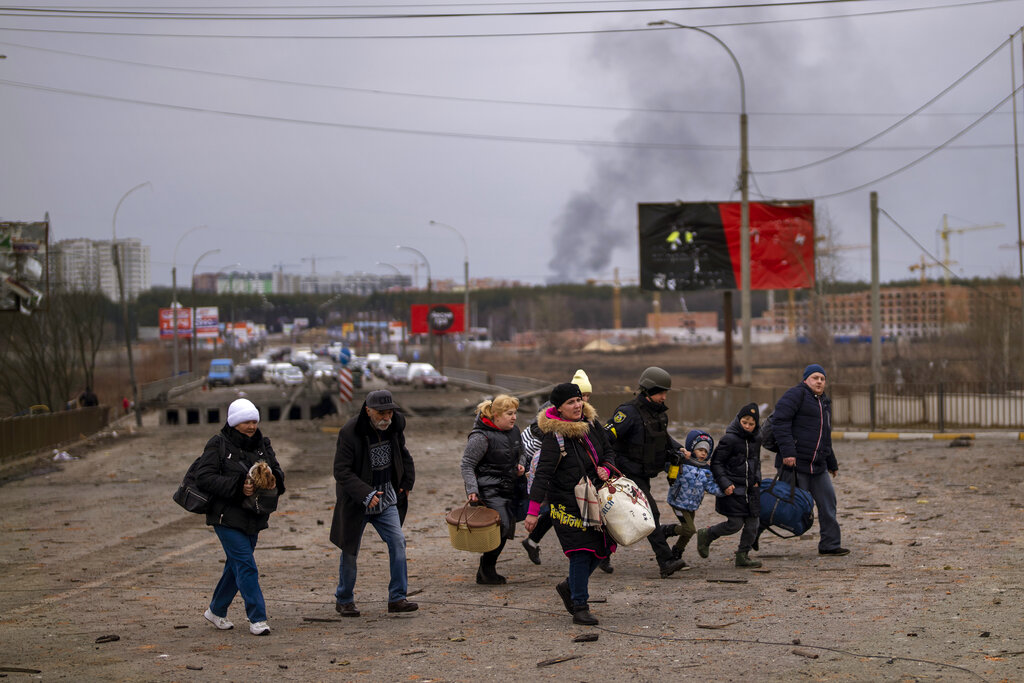A third round of peace talks between Russia and Ukraine is expected Monday following a weekend of escalating violence that led to the slaughter of innocent civilians, a call for more sanctions, and news that an additional 400 U.S. soldiers would be deployed to Lithuania.
In an interview that aired overnight, Ukrainian President Volodymyr Zelensky warned his country was bracing itself for a renewed bombardment of major cities. Zelensky also called for a new sanctions package against Russia and said Moscow’s continued invasion shows that Vladimir Putin “has not abandoned [his] plan against Ukraine.”
Zelensky also called for “a boycott of Russian exports, in particular the rejection of oil and oil products from Russia,” and said that the tougher measures could be called “an embargo, or just morality.”
Zelensky also warned that Russian forces are planning to bomb Ukraine’s major defense industry production sites, which are located in heavily populated cities.
“It is murder,” he said. “Simply murder.”

Moscow has provided a list of demands that Ukraine must adhere to if it wants peace, Kremlin spokesman Dmitry Peskov told Reuters.
KREMLIN PROVIDES LIST OF DEMANDS TO UKRAINE FOR ENDING WAR
The demands include Ukraine ceasing all military actions, changing its constitution to ensure neutrality, acknowledging Crimea as Russian territory, and recognizing two republics in the Donbas region as independent territories.
The specific changes to Ukraine’s constitution include rejecting any attempt to join other blocs, such as NATO or the European Union, Peskov said. The demand comes less than a week after the EU’s European Parliament voted in favor of Ukraine becoming a candidate to join.
The demands come as U.S. Secretary of State Antony Blinken on Monday said that the United States would send an additional 400 troops to Lithuania, as part of the expanded U.S. deployment to NATO member states. The troops are from the 1st Armored Brigade Combat Team and will join 600 other U.S. troops already stationed in Lithuania, Blinken said during a joint morning news conference with Lithuania’s foreign minister in Vilnius.
Meanwhile, Turkey’s foreign minister Mevlut Cavusoglu said Russian and Ukrainian foreign ministers will meet in the Turkish resort city of Antalya on Thursday. Turkey, a NATO member that shares a maritime border with Russia and Ukraine in the Black Sea, has economic and military ties to both countries and on multiple occasions has offered to serve as a mediator between the two warring sides. Cavusoglu said he hoped the meeting would be “a turning point” in the battle and “an important step towards peace and stability.”
The comments come as Rafael Grossi, director-general of the International Atomic Energy Agency, said that the Russian strikes on Ukrainian atomic sites pose “unprecedented danger of a nuclear accident, risking the lives of people living in Ukraine and in neighboring countries, including Russia.”

French President Emmanuel Macron, who had a 90-minute call with Putin last week, slammed Moscow’s offer to set up humanitarian corridors that head into Russia as a “moral and political cynicism” that he finds “insufferable.”
“Humanitarian actors need to be able to intervene, so we must get full ceasefires when they intervene to place under protection women, children, men who need to be protected,” he said Monday during a sit-down interview with French news broadcaster LCI. “[We must] be able to get them out of the conflict area.”
On Sunday, a Russian force advancing on the capital of Kyiv fired mortar shells at an already-battered bridge being used by Ukrainians trying to escape the fighting.
Panicked, civilians began running. In the end, four people were found dead on the pavement.
Crowds have formed around the damaged bridge over the Irpin River for several days, seeing it as one of their only options to escape.
Ukrainian forces had initially blown up the bridge in an attempt to slow the Russian advance. About a dozen or so Ukrainian soldiers still left near Irpin on Sunday were not fighting but helping carry civilians’ luggage and children, according to the New York Times.
To get to the bridge, civilians had to cross a hundred yards on the side of the bridge closer to Kyiv. People went in small groups and ran together. Ukrainian soldiers ran out, picked up children, helped with luggage, and then ran for cover behind cinder block walls, four Times reporters witnessed.

Mortar shells fell first, about 100 or so yards from the bridge, then shifted to a series of thunderous blasts into a section of the street where people were trying to escape. The Times team witnessed and documented the moment that civilians were fired upon. As the mortars got closer, people, including children, ran. But there had been nothing to hide behind. One shell landed in the street, sending up a cloud of concrete dust leaving a mother, her teenage son, 8-year-old daughter, and family friends sprawled on the street. Ukrainian soldiers tried to rush in and help, but it was too late. The mother and her children were dead. The friend traveling with them later died.
The weekend’s violence bled into Monday, with predawn explosions lighting up the sky in Mykolaiv, a coastal city on the path to Odessa.
CLICK HERE TO READ MORE FROM THE WASHINGTON EXAMINER
The city awoke at 5 a.m. to an artillery barrage. Several rockets landed in a neighborhood of dense apartment blocks in the eastern part of the city, blowing out windows and sending shrapnel through walls, the Times reported. The intense shelling seemed only to fuel anger toward Putin.
“Tell Putin that he is killing peaceful people,” Olga Kolokyova said. The glass had been blown out of her front window, and her door had been destroyed. The 48-year-old said she hid in her bathroom during the assault. Through sobs, she said, “[Putin] thinks that we are going to submit to him? I want him to go through what I went through this morning.”

